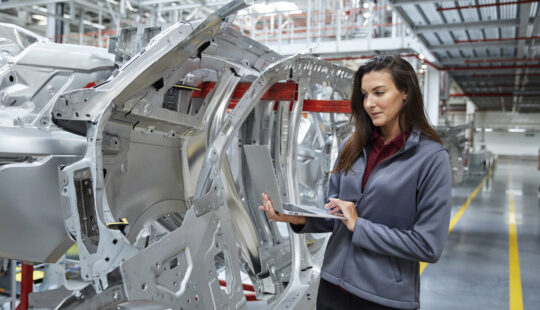John has loved Mary for three decades. Thirty years ago, an artificial intelligence (AI)-based program needed several minutes to understand that John was the subject and Mary was the object of the word “love.” Today, we can translate pages of documents in milliseconds, unlock our mobile phone by looking at it, and unclog e-mail bottlenecks with ease.
This was how Dr. Feiyu Xu, global head of AI at SAP, opened her fascinating session at the SAP Sapphire Orlando event, explaining how advances in high-performance computing, Big Data, and machine learning have commercialized AI, turning it into value for people and business.
This article is part of the SAP Pioneers series, which features innovators at SAP who are charting new horizons in the cloud and guiding companies across the globe through exciting areas of innovation.
An Inspirational Pioneer for AI
Award-winning researcher and startup founder Dr. Xu joined SAP in 2020 to help realize the technology’s full potential for business value in both consumer and industrial sectors. Among the first generation of students to study AI, she’s undauntedly met the challenge of creating the company’s holistic strategy tackling this tremendous market opportunity. After attending her session, I spoke with her about how companies are bringing AI into the business for intelligent transformation.
“What’s important is having an understanding of business processes and the right data so you can embed AI systematically into applications company-wide where it provides intelligence that guides better decision-making and the development of differentiated products and services to drive market growth,” she said. “SAP has access to that level of customer information given its broad product portfolio, deep industry expertise, and strong ecosystem of partners.”
Multicultural Perspectives behind Unified AI Strategy
Dr. Xu, who grew up in China and completed her AI undergraduate and post-graduate studies in Germany, credited some of her foundational career strengths to her multicultural perspective. She’s certainly applied those insights, as she’s created a worldwide team she leads from SAP offices in Berlin.
“I bring both my Chinese heritage and the research lessons I learned from Germany to my work today,” she said. “Working with teams of AI scientists, business leaders, product managers, and customers worldwide, it’s important to have open discussions as we fulfill our responsibilities to SAP customers. We’ve been an AI pioneer, and this technology remains central to our intelligent enterprise transformation along with our customers.”
AI Ethics and Security Are Priorities
Noting that large-scale AI gives organizations a major competitive edge, Dr. Xu reinforced the company’s commitment to helping customers make business process improvements while staying safe and secure.
“We’re focused on customer education so they understand how to get the most from AI using SAP software applications for automation, optimization, and forecasting across the organization,” she said. “At the same time, we adhere to a global AI ethics policy with principles for responsible use of this important technology.”
Real-World Value from AI
According to the latest Gartner survey, AI remains the top priority for CEOs for the third year in a row. During her session at SAP Sapphire Orlando, Dr. Xu shared a huge list of ways that AI now contributes to the intelligent transformation of organizations. As business travel returns, AI makes expense reporting a breeze. Manufacturers are using AI to automatically identify and reorder parts before they’re damaged and can negatively impact production goals. AI-based tools will rise to any e-mail challenge, automatically routing messages to the appropriate recipients for time-saving efficiencies.
“There are so many intelligent applications for AI across business processes,” said Dr. Xu. “AI helps organizations discover market trends and turn prospects into lifelong customers. In manufacturing, AI improves efficiencies from design to production. Especially during times of disruption, AI can help reduce supply chain risks with better forecasts for short- and long-term planning. Organizations can adjust operations and people strategies to scale in sync with changing market demands.”
Intelligence Combines Humans Plus Machines
Dr. Xu cited business results from customers in numerous industries using SAP solutions with embedded AI. One railway transportation company achieved 99% automation rates to speed up invoicing and payments. A technology company gained 24/7 access to time-critical order information with conversational AI. A telecommunications provider filled 77% of vacant positions by automatically matching existing qualified employees with open positions.
What’s important to remember is that just like the people who program it, AI is constantly learning. IDC analysts predicted that by next year, 60% of businesses will embrace a decision-making model that combines the power of AI and human judgment for more informed decision-making. By 2026, IDC expected that 85% of enterprises will combine human expertise with AI, machine learning, natural language processing, and pattern recognition to augment foresight across the organization, making workers 25% more productive and effective. As for John and Mary, AI has left their love story in the dust.
Read more stories from the SAP Pioneers series.
Follow me @smgaler.



